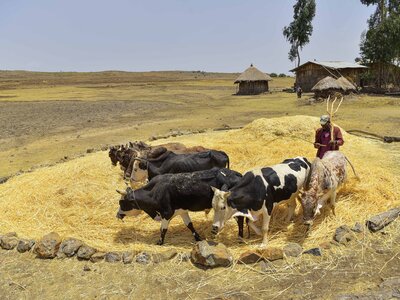The R4 Rural Resilience Initiative
- US$2.1 million
- in payouts triggered following severe climate-related shocks in 10 countries
- US$12.9 million
- of premiums paid under risk-transfer mechanisms supported by WFP
- 550,000
- vulnerable households and families reached in 18 countries across Africa, Asia, and Latin America and the Caribbean
The number of people affected by increasingly severe weather events continues to rise.
Climate-related shocks led to acute food crises in 18 countries in 2023, and affected over 77 million people.
Vulnerable communities are more likely to suffer heavy losses from climatic shocks as they often lack access to formal risk management and social protection mechanisms. Their vulnerability to climate-related shocks is a constant threat to securing enough nutritious food throughout the year.
The World Food Programme (WFP) is deploying innovative tools and strategies to reduce and mitigate risks, in order to overcome hunger, achieve food security and enhance resilience.
WFP and Oxfam America launched the R4 Rural Resilience Initiative (R4) in 2011, to enable vulnerable rural families to increase their food and income security by managing climate-related risks.
As of 2023, R4 had benefited nearly 550,000 vulnerable households and families in 18 countries across Africa, Asia and Latin America and the Caribbean.
This was achieved through a combination of four risk-management strategies: improved resource management through nature-based solutions or improved agricultural practices (risk reduction); access to insurance (risk transfer); increased investment, livelihoods diversification and microcredit (prudent risk taking); and savings (risk retention).
Through its innovative integrated climate risk management approach, R4 enables the poorest farmers to access crop insurance by participating in risk-reduction activities. Assets built through such activities – including WFP’s Food Assistance for Assets programmes – promote the resilience of farmers and their families by steadily decreasing vulnerability to disaster risks over time.
When a shock hits, compensation for weather-related losses prevents farmers from having to take desperate measures such as selling productive assets and stimulates faster recovery. By protecting farmers’ investments in case of a bad season, R4 enables them to invest in riskier but more remunerative enterprises, as well as in seeds, fertilizers and new technologies.
Evidence suggests that R4 participants are more likely to keep kids in school, retain household assets, and continue to buy and eat healthier food on a regular basis.
The R4 initiative also has positive effects on gender equality. In Bangladesh, the Climate Risk Insurance programme has proven to be highly beneficial for women living in flood-affected areas, increasing their capacity to lead on household decisions and contribute to the community.
To ensure long-term sustainability, R4 contributes to the creation of rural financial markets. It does this by building the capacity of households, local insurance companies and microfinance institutions, and gradually supporting farmers to start paying for insurance in cash.
To support the scale-up of insurance, the products that are developed through R4 can be distributed to clients through additional channels such as government social protection systems, other donor-funded programmes or commercial schemes. In parallel, R4 strengthens the capacity of stakeholders to progressively take over the insurance processes.







